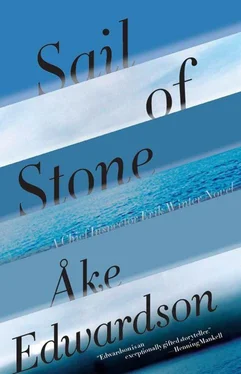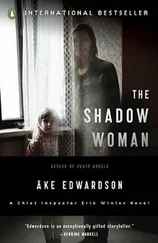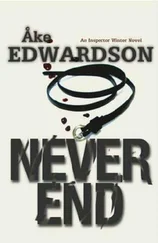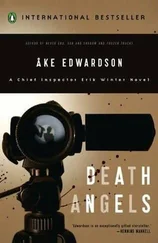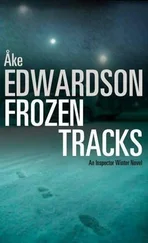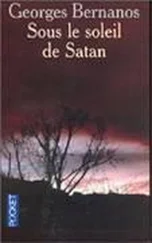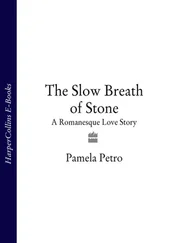She could hear the rain on the window now. It had been raining on and off all afternoon. She saw water on the floor. A few pieces of gravel or some kind of dirt. Puddles on the floor, small, but they were there. Her feet suddenly started to freeze, as though her naked feet were standing in that ice water. She looked down, followed a trail that led from the kitchen out into the hall, or vice versa. There was water on the floor of the hall, and it hadn’t come from her shoes.
She looked at the knob of her apartment door. Fingerprints? Hardly. She looked at the floor. Footprints. Uh-uh.
She felt her knees weaken. She was about to lose her balance, but she managed to stagger into the bedroom and lie down and dial the number and wait for an answer.
“Are you really sure?” Halders said after she had quickly explained.
“I’m sure,” said Aneta. She felt more calm now.
“Well, shit,” said Halders.
“It might have been him,” she said. “Shit.”
She heard Halders breathing.
“We’ll look at the lock,” he said. “And the doorknob, and the floor.”
“Whoever was here must have had a key,” she said. “Or a picklock.”
“We’ll probably find out,” said Halders.
“God,” she said. “What is this?”
“You’re not renting from Sigge Lindsten, are you?” said Halders.
“Is that supposed to be funny?”
“Sorry, Aneta, sorry. I’ll ask the guys up at Lorensberg to come by right away.”
“Yeah, yeah.”
“They can give you a ride home-to here.”
“Thanks.”
“You live here, starting now.”
“Fredrik…”
“Doesn’t it make sense?”
She couldn’t answer.
“At least until we’ve checked the lock and changed it and installed a deadbolt and dug a moat,” said Halders.
For a microsecond she saw Halders sneaking around the apartment while she lay in the bathtub. Fredrik did everything he could to get her to move to his house in Lunden.
But he wouldn’t have had time to get back to his house before she called.
God. She needed something strong. She was suddenly tired, dead tired.
They took the road through Forres again. On High Street Winter saw a poster he’d missed earlier: Nairn International Jazz Festival. Jane Monheit, David Berkman Quartet, Jim Galloway, Jake Hanna. It had ended two weeks ago.
The police station was next to the south exit, right across from the Ramnee Hotel, which looked like a colonial manor. Everything around here sure is Victorian, thought Winter.
But the police station wasn’t Victorian, it was built in the bunker style of the brotherhood. A teenager was playing with a ball on the lawn outside, one-two-three-four-five on his foot. A police van was parked on the graveled area that served as a parking lot. “Crimestoppers” was painted in white on the van’s black side. It might as well say “Ghostbusters,” thought Winter. At least if Steve and I were driving around in it. We’re hunting ghosts.
It wasn’t possible to determine whether the windows were tinted or just dirty. Leaves were blowing across the lot. Fall was here.
Winter knew that Macdonald’s uncle had been a policeman here and had retired quite recently.
“There was a period in my teens when I was a little wild,” Macdonald had said in the car. “Uncle Gordon picked me up discreetly once, in a neighborhood south of High, and that was kind of a turning point.”
“What were you doing? Robbing cars?”
“It wasn’t anything that ended up in the papers,” Macdonald had answered, and that was that. Winter hadn’t asked any more questions. Whatever it was, maybe it had caused him to become a policeman, and a good policeman at that, he thought.
Inside, a woman got up from a desk behind the counter, which was partially made of steel. Never seen that, thought Winter. Wood and steel. The woman was dressed in a black uniform with white bands. She had to be near retirement. Winter noticed her powerful upper arms. There was an open door behind her.
She didn’t recognize Macdonald. He greeted her and introduced himself and asked for someone.
“Oh, it’s you!” she said enthusiastically. “Jake has told us about you comin’ here.”
“Just a wee short stop,” said Macdonald.
“Local laddie make good,” she said, looking proud. “Hows’t down in the Smoke?”
“It’s smoky,” said Macdonald, and the woman smiled with her Scottish teeth.
“How’s things ’ere?” asked Macdonald.
“Pretty quiet since you left town, my lad,” she said, smiling again. “From what I’ve heard.”
“I’ve tried to behave myself since then,” said Macdonald.
“That’s outside the statute o’limitations,” said a loud voice from the doorway. A man came through it with difficulty; he was about as wide as the door and slightly shorter.
“Hello, Jake,” said Macdonald.
“Hello, my boy,” said Chief Inspector Jake Ross, giving him a handshake and the traditional punch on the shoulder.
Macdonald introduced Winter. Ross showed them into his office. Through the window, Winter could see the kid playing with the ball. Ross noticed that Winter was looking.
“Comes here every day,” said Ross. “I don’t know if he wants t’tell us somethin’.” Ross went on. “I spoke with Craig in Ness.”
“Was it the first time?” asked Macdonald.
“Come on, Steve. I might not like that Englishman, but we’re all professionals ’ere, right?” Ross looked at Winter. Winter nodded in agreement. Ross took out a bottle of whisky and, with professional skill, poured some into three small glasses.
“Not bad,” said Macdonald after a first sip. Winter held up the bottle. Dallas Dhu 1971. He tasted it. Ross studied him.
“Well?” Ross asked.
“It’s almost chewy,” said Winter.
Ross looked at Macdonald and then back at Winter.
“You’ve had this b’fore, my lad?” asked Ross.
“No,” said Winter. He kept the liquor in his mouth and swallowed. “Isn’t there some dark chocolate and a dash of bitter on the palate?”
“There certainly is, there certainly is,” said Ross, smiling. “Why don’t you start working for me, laddie? We could use professional people up here.”
“Professional drinkers,” said Macdonald.
“The finish, the finish?” asked Ross, who hadn’t heard Macdonald.
The next test. Winter delayed his answer, thinking.
“Smooth, of course. Dry and very long. Kind of oak-sappy. But it also goes with that flowery sweetness that still lingers in the nose.”
“ Yes, ” Ross said, raising his glass. “You’ve got the job.”
“The distillery is unfortunately closed,” said Macdonald.
“You’re drinking history here, my lads,” Ross said.
Macdonald told the tragic story as they drove south on the A940. Dallas Dhu Distillery, which was three miles ahead of them, had closed in 1983, on its hundredth anniversary, put out of business by the Distillers Company. Several of the oldest and smallest distilleries in Speyside had disappeared.
There weren’t many bottles of Dallas Dhu left. They had, as Ross pointed out, drunk history.
“What does ‘Dhu’ mean?” Winter asked.
“‘Black,’” said Macdonald, “or ‘dark,’ in this case. It’s actually the same Gaelic word as Dubh in MacDuhb, MacDuff.” He turned onto a smaller road. “And the name Dallas is Gaelic for ‘valley and water.’”
They were driving through valleys now. Winter saw water. There were forests, but they were small, like clusters of trees. The trees looked like they might move at any moment.
Winter saw the sign for the distillery.
“The interesting thing is that Historic Scotland rebuilt the place into a gigantic museum,” Macdonald said, slowing down. “It’s the only one of its kind in Scotland. And the equipment is the original Victorian stuff. There’s no electricity there.”
Читать дальше
